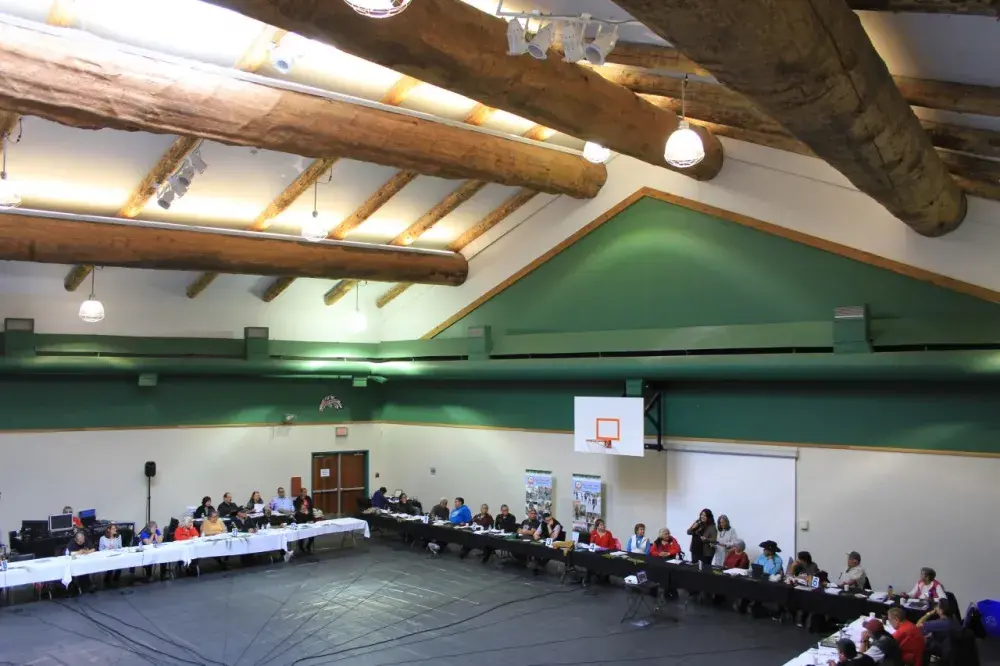As the federal government develops a national Indigenous languages act, Nuu-chah-nulth leaders are raising the urgency of protecting and promoting their ancestral dialects.
The issue was discussed by representatives at the Nuu-chah-nulth Tribal Council Annual General Meeting on Sept. 20, where leaders agreed that the need to revitalize the Nuu-chah-nulth language is at a critical juncture. During the meeting at the House of Huu-ay-aht in Anacla, some estimated that the number of fluent speakers in their nation could be less than a dozen.
“Now we’re down to maybe one hand,” said Robert Dennis, Chief Councillor for the Hii-ay-aht First Nations, who stressed the need for an action plan. “It is critical. Our action will show how critical it is.”
The discussion followed a presentation by the Quu-quu-atsa Language Society, which has taught Nuu-chah-nulth to approximately 200 students since 2012. The society is now supporting classes at North Island College, including a two-year program that leads to a certificate through the University of Victoria. Another course was launched this September that teaches Nuu-chah-nulth one evening a week for no more than $40, with a follow up course running January to April. Twenty five students are currently enrolled, with another 13 on the waiting list.
“People have said that it opens up something inside them,” said Jane Jones, vice-president of the Quu-quu-atsa Language Society and elder in residence at NIC.
The course considers the different pronunciations and word meanings throughout Nuu-chah-nulth territory.
“There’s four different dialects that we can teach in one class,” said Jones. “Maybe not as much Ditidaht, but we’re working on it.”
In response to a request from the society for support, the NTC passed a broader motion in the interest of language revitalization. The motion supports Quu-quu-atsa in its endeavours, and directs the tribal council to prepare an action plan to protect the Nuu-chah-nulth language by finding funds to meet language needs. The motion also directs the NTC to prepare a map of Nuu-chah-nulth territory with the names of significant places, and develop the means for a designated location for learning the ancestral language.
“We need to think big and a language centre is something that will benefit all Nuu-chah-nulth,” said Toquaht Tyee Ha’wilth Anne Mack, who is currently learning Nuu-chah-nulth. “What I imagine in my mind is a place where you can go, our students can go, and have a place to stay. Our students can be there for any length of time that they need to learn this language. We have the potential now to get that done.”
A supportive environment for learning Nuu-chah-nulth is essential, due to the experience of past generations who attended residential school, stressed the Quu-quu-atsa representatives. They noted times during classes when fluent speakers flinched while speaking Nuu-chah-nulth for fear of getting hit.
Yuułuʔiłʔatḥ elder Larry Baird recalled such punishment for speaking in his ancestral tongue.
“I was beaten, I was made to eat soap - the only language that you knew in residential school was English,” he said.
In 2008 the Government of Canada issued a formal apology for the past abuses of the residential school system, but Baird argued that compensation for the loss of languages should have gone along with this.
“One of the biggest mistakes we made was accepting the apology without a billion dollars to look after our language,” he said. “The compensation that we got was disgusting.”
Efforts are currently underway in Ottawa to formalise legislation that preserves Indigenous languages in Canada. An Indigenous languages act is being developed in consultation with Aboriginal communities, and 20 early engagement sessions were held from August 2017 to February to inform this process, but these input opportunities did not reach Vancouver Island.
“The legislation will be co-developed in a way that supports the meaningful implementation of the Truth and Reconciliation Commission’s Calls to Action, the United Nations Declaration on the Rights of Indigenous Peoples and the federal government’s commitment to a nation-to-nation, government-to-government, and Inuit-Crown relationship,” stated the Government of Canada on its plans for a future Indigenous languages act.
“There must be something in there that subsidizes any native person that wants to learn their language,” said Mack of the developing legislation. “We should be the ones saying what reconciliation is and what it means to us.”







